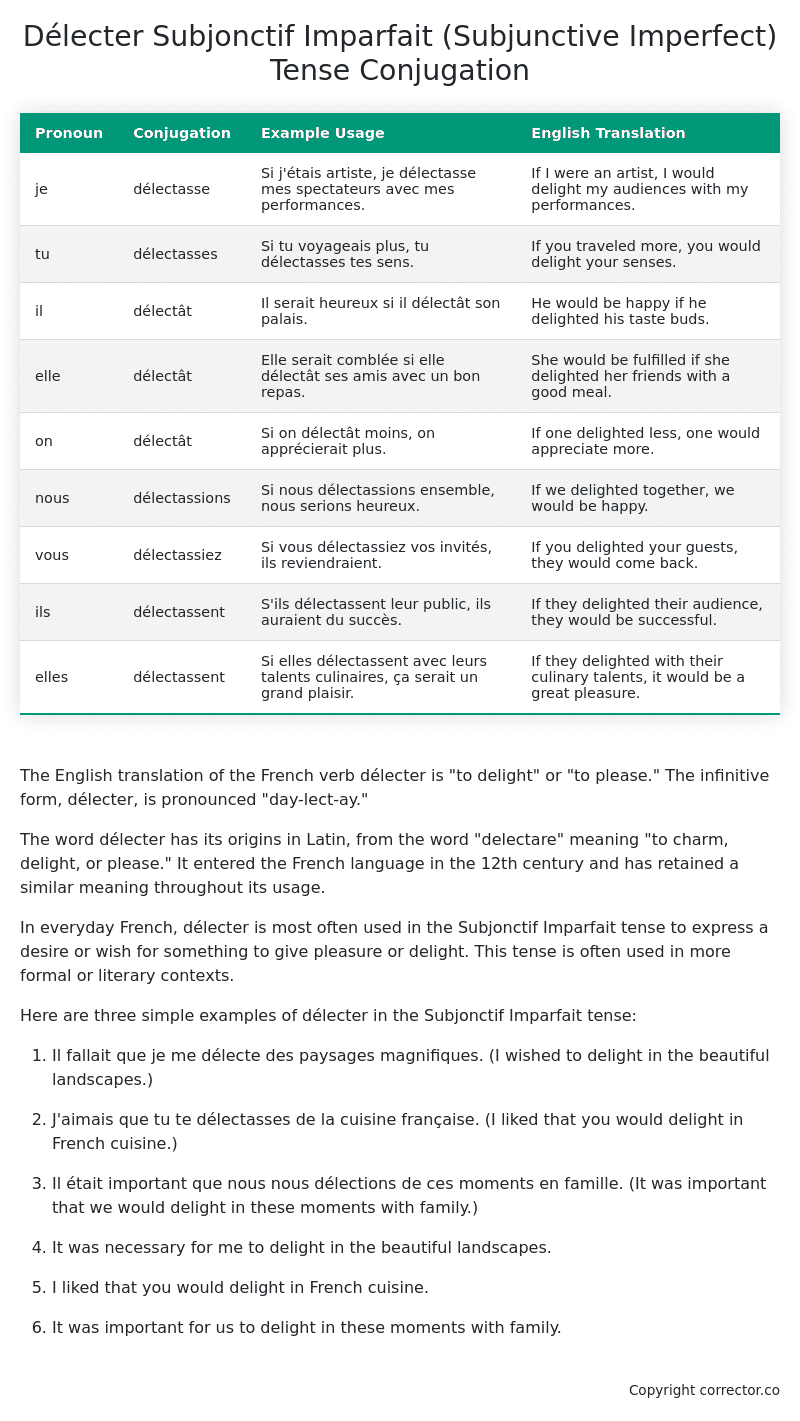Subjonctif Imparfait (Subjunctive Imperfect) Tense Conjugation of the French Verb délecter
Introduction to the verb délecter
The English translation of the French verb délecter is “to delight” or “to please.” The infinitive form, délecter, is pronounced “day-lect-ay.”
The word délecter has its origins in Latin, from the word “delectare” meaning “to charm, delight, or please.” It entered the French language in the 12th century and has retained a similar meaning throughout its usage.
In everyday French, délecter is most often used in the Subjonctif Imparfait tense to express a desire or wish for something to give pleasure or delight. This tense is often used in more formal or literary contexts.
Here are three simple examples of délecter in the Subjonctif Imparfait tense:
-
Il fallait que je me délecte des paysages magnifiques. (I wished to delight in the beautiful landscapes.)
-
J’aimais que tu te délectasses de la cuisine française. (I liked that you would delight in French cuisine.)
-
Il était important que nous nous délections de ces moments en famille. (It was important that we would delight in these moments with family.)
-
It was necessary for me to delight in the beautiful landscapes.
-
I liked that you would delight in French cuisine.
-
It was important for us to delight in these moments with family.
Table of the Subjonctif Imparfait (Subjunctive Imperfect) Tense Conjugation of délecter
| Pronoun | Conjugation | Example Usage | English Translation |
|---|---|---|---|
| je | délectasse | Si j’étais artiste, je délectasse mes spectateurs avec mes performances. | If I were an artist, I would delight my audiences with my performances. |
| tu | délectasses | Si tu voyageais plus, tu délectasses tes sens. | If you traveled more, you would delight your senses. |
| il | délectât | Il serait heureux si il délectât son palais. | He would be happy if he delighted his taste buds. |
| elle | délectât | Elle serait comblée si elle délectât ses amis avec un bon repas. | She would be fulfilled if she delighted her friends with a good meal. |
| on | délectât | Si on délectât moins, on apprécierait plus. | If one delighted less, one would appreciate more. |
| nous | délectassions | Si nous délectassions ensemble, nous serions heureux. | If we delighted together, we would be happy. |
| vous | délectassiez | Si vous délectassiez vos invités, ils reviendraient. | If you delighted your guests, they would come back. |
| ils | délectassent | S’ils délectassent leur public, ils auraient du succès. | If they delighted their audience, they would be successful. |
| elles | délectassent | Si elles délectassent avec leurs talents culinaires, ça serait un grand plaisir. | If they delighted with their culinary talents, it would be a great pleasure. |
Other Conjugations for Délecter.
Le Present (Present Tense) Conjugation of the French Verb délecter
Imparfait (Imperfect) Tense Conjugation of the French Verb délecter
Passé Simple (Simple Past) Tense Conjugation of the French Verb délecter
Passé Composé (Present Perfect) Tense Conjugation of the French Verb délecter
Futur Simple (Simple Future) Tense Conjugation of the French Verb délecter
Futur Proche (Near Future) Tense Conjugation of the French Verb délecter
Plus-que-parfait (Pluperfect) Tense Conjugation of the French Verb délecter
Passé Antérieur (Past Anterior) Tense Conjugation of the French Verb délecter
Futur Antérieur (Future Anterior) Tense Conjugation of the French Verb délecter
Subjonctif Présent (Subjunctive Present) Tense Conjugation of the French Verb délecter
Subjonctif Passé (Subjunctive Past) Tense Conjugation of the French Verb délecter
Subjonctif Imparfait (Subjunctive Imperfect) Tense Conjugation of the French Verb délecter (this article)
Subjonctif Plus-que-parfait (Subjunctive Pluperfect) Tense Conjugation of the French Verb délecter
Conditionnel Présent (Conditional Present) Tense Conjugation of the French Verb délecter
Conditionnel Passé (Conditional Past) Tense Conjugation of the French Verb délecter
L’impératif Présent (Imperative Present) Tense Conjugation of the French Verb délecter
L’infinitif Présent (Infinitive Present) Tense Conjugation of the French Verb délecter
Struggling with French verbs or the language in general? Why not use our free French Grammar Checker – no registration required!
Get a FREE Download Study Sheet of this Conjugation 🔥
Simply right click the image below, click “save image” and get your free reference for the délecter Subjonctif Imparfait tense conjugation!

Délecter – About the French Subjonctif Imparfait (Subjunctive Imperfect) Tense
Formation
Common Everyday Usage Patterns
Interactions with Other Tenses
Subjonctif Présent
Indicatif Passé Composé
Conditional
Conditional Perfect
Summary
I hope you enjoyed this article on the verb délecter. Still in a learning mood? Check out another TOTALLY random French verb conjugation!


